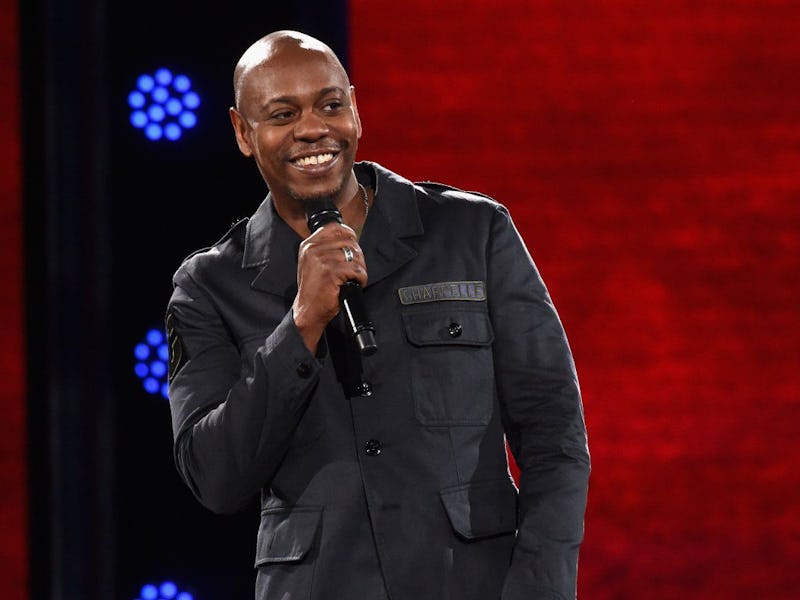
Dave Chappelle’s two new stand-up specials are thankfully devoid of jokes about the Trump presidency, which makes sense because they were filmed in 2015. Chappelle does deliver what almost feels like obligatory material on Bill Cosby’s multiple rape charges, a lot of jokes that will land him in hot water with transgender advocacy groups, and stories about finding time to masturbate when you have a wife and kids. What no one expected from the veteran comedic writer was a long diatribe on superheroes. The fun part? He’s not really tired of them, he just thinks we’re not using them intelligently.
Chappelle launches into superhero analysis when he describes being cornered at the Oscars by two movie producers. He sizes them up — a gay reporter and a macho Texan — and pitches two fake superhero movies based on what he thinks they’d like to see. In doing so, he ends up delivering biting commentary on two extremely popular comic book tropes.
Dave Chappelle describes superheroes in "The Age of Spin"
The first of his fake movies, Same Hero, New Boots, sounds a lot like Marvel’s recent forays into diversifying their superhero lineup (only on the page).
Chappelle describes a San Francisco sous chef who’s bitten by a radioactive rat and given superhuman powers. “Because he’s gay, though,” Chappelle adds, the superhero can’t choose just one costume, and therefore the victims he saves never know exactly who he is.
Dave Chappelle in "The Age of Spin" on Netflix
Critics have begun narrowing their eyes at Marvel — and fans have responded by not buying as many books — because the publisher keeps swapping in women or people of color or LGBT folks into the roles once held by white, straight men. Though some of Marvel’s new characters have long histories in comics and fit organically in new stories — She-Hulk, Moon Girl, America Chavez, and Ms. Marvel are bright spots — other books have been accused of simply pandering to self-professed “woke” readers.
Riri Williams — written by Brian Michael Bendis, a white man who also wrote the first black Spider-Man — has been criticized for being more of a “diversity bingo” mashup of tropes rather than a girl whose experiences feel real. Nick Spencer’s work on the black superhero Sam Wilson, aka Captain America, has been met with similar concerns. When Spencer, a white man, wrote an issue of Sam Wilson: Captain America addressing the Ferguson protests, he had the black superhero pick a truly strange viewpoint in the debate.
To impress the Texan producer character, Chappelle offers up another superhero archetype, and this one feels familiar too. “He fights for truth, justice, and the American way, like Superman,” Chappelle says, “but more than Superman, […] he can’t even activate his powers until he touches a woman’s vagina.” The conundrum Chappelle presents, in order to please this Texan conservative, is that an all-powerful superhero who wants to save thousands of people is also a rapist.
What Chappelle describes here is a violent anti-hero who’ll immediately sound familiar to fans of the Punisher, Deadpool, The CW’s Green Arrow, Red Hood, Spawn, and even Batman. None of those characters are rapists, but the rape analogy isn’t new. Alan Moore’s Watchmen lampooned these dark, troubled “heroes” by making the Comedian a rapist with a heart of gold, forcing readers to grapple with Chappelle’s question: Which acts define you? If you’re a rapist who habitually saves the lives of thousands, does one act cancel out the other? Is it a numbers game?
Further, by pitching this hypothetical idea as a superhero movie, Chappelle teases his audience by pointing out the comfort zone many of us have settled into. Our darkest superheroes will torture people, in most cases, but won’t kill. They may be sexist, but they’re not rapists. In a set clearly written by someone who’s engaged with superheroes as a fan and a cultural critic, Chappelle does what satirical comics are attempting to do: shed light on the things we take for granted in Marvel stories, and force us to contend with the most uncomfortable parts of idolizing superhumans.
Dave Chappelle’s “The Age of Spin” is available to stream now on Netflix.